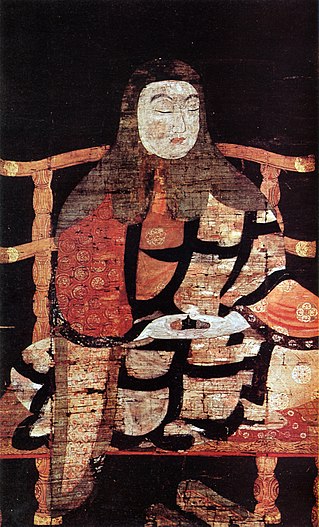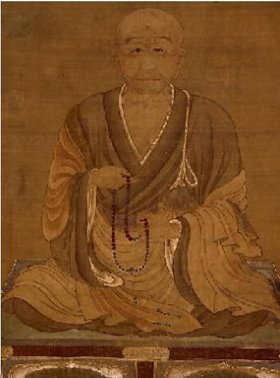Related Research Articles

Tendai, also known as the Tendai Lotus School, is a Mahāyāna Buddhist tradition with significant esoteric elements that was officially established in Japan in 806 by the Japanese monk Saichō. The Tendai school, which has been based on Mount Hiei since its inception, rose to prominence during the Heian period (794–1185). It gradually eclipsed the powerful Hossō school and competed with the rival Shingon school to become the most influential sect at the Imperial court.

Buddhism was first established in Japan in the 6th century CE. Most of the Japanese Buddhists belong to new schools of Buddhism which were established in the Kamakura period (1185-1333). During the Edo (Tokugawa)-period (1603–1868), Buddhism was controlled by the feudal Shogunate. The Meiji-period (1868–1912) saw a strong response against Buddhism, with persecution and a forced separation between Buddhism and Shinto.

Ennin, better known in Japan by his posthumous name, Jikaku Daishi (慈覺大師), was a priest of the Tendai school of Buddhism in Japan, and its third Zasu. Ennin was instrumental in expanding the Tendai Order's influence, and bringing back crucial training and resources from China, particularly esoteric Buddhist training and Pure Land teachings.

Enryaku-ji is a Tendai monastery located on Mount Hiei in Ōtsu, overlooking Kyoto. It was first founded in 788 during the early Heian period (794–1185) by Saichō (767–822), also known as Dengyō Daishi, who introduced the Tendai sect of Mahayana Buddhism to Japan from China. The temple complex has undergone several reconstruction efforts since then, with the most significant taking place in 1642 under Tokugawa Iemitsu. Enryaku-ji is the headquarters of the Tendai sect and one of the most significant monasteries in Japanese history. As such, it is part of the UNESCO World Heritage Site "Historic Monuments of Ancient Kyoto ". The founders of Jōdo-shū, Jōdo Shinshū, Sōtō Zen, and Nichiren Buddhism all spent time at the monastery. Enryaku-ji is also the center for the practice of kaihōgyō.

Saichō was a Japanese Buddhist monk credited with founding the Tendai school of Buddhism based on the Chinese Tiantai school he was exposed to during his trip to Tang China beginning in 804. He founded the temple and headquarters of Tendai at Enryaku-ji on Mount Hiei near Kyoto. He is also said to have been the first to bring tea to Japan. After his death, he was awarded the posthumous title of Dengyō Daishi (伝教大師).

Mount Hiei is a mountain to the northeast of Kyoto, lying on the border between the Kyoto and Shiga Prefectures, Japan.

The Thirteen Buddhas is a Japanese grouping of Buddhist deities, particularly in the Shingon and Tendai sects of Buddhism. The deities are, in fact, not only Buddhas, but also include bodhisattvas. In Shingon services, lay followers recite a devotional mantra to each figure, though in Shingon practice, disciples will typically devote themselves to only one, depending on what the teacher assigns. The chanting of the mantras of the Thirteen Buddhas is a basic practice followed by Shingon and Tendai lay followers. They are also important in funeral and apotropaic / protective rituals.

Shugendō is a highly syncretic Esoteric Buddhist religion, a body of ascetic practices that originated in the Nara Period of Japan having evolved during the 7th century from an amalgamation of beliefs, philosophies, doctrines and ritual systems drawn primarily from Esoteric Buddhism, local folk-religious practices, Shinto mountain worship, and Taoism. The final purpose of Shugendō is for practitioners to find supernatural power and save themselves and the masses by conducting religious training while treading through steep mountain ranges. Practitioners are called Shugenja or Yamabushi. The mountains where shugendo is practiced are all over Japan, and can span multiple mountains within one range such as the Ōmine mountain range with Mount Hakkyō and Mount Ōmine or the Ishizuchisan mountain range with Kamegamori and Tengudake.

Genshin, also known as Eshin Sōzu (恵心僧都), was a prominent Japanese monk of the Tendai school, recognized for his significant contributions to both Tendai and Pure Land Buddhism. Genshin studied under Ryōgen, a key reformer of the Tendai tradition, and became well known for his intellectual prowess, particularly after his success in a major debate at Mount Hiei in 974.

Tendai Laxton Biti is a Zimbabwean politician who served as Finance Minister of Zimbabwe from 2009 to 2013. He is the second Vice President of Citizens Coalition for Change. He was the Secretary-General of the Movement for Democratic Change and the subsequent Movement for Democratic Change – Tsvangirai (MDC-T) political parties and a Member of Parliament for Harare East until he was expelled from the party and recalled from parliament in mid-2014,before winning the seat again in 2018.

Tendai Mtawarira is a Zimbabwean-South African retired professional rugby union player who last played for Old Glory DC in Major League Rugby and previously for the South Africa national team and the Sharks in Super Rugby. He was born in Zimbabwe and qualified for South Africa on residency grounds, before later acquiring South African citizenship. Mtawarira, a prop, is known by the nickname Beast.

The Movement for Democratic Change – Tsvangirai (MDC–T) is a centre-left political party and was the main opposition party in the House of Assembly of Zimbabwe ahead of the 2018 elections. After the split of the original Movement for Democratic Change in 2005, the MDC–T remained the major opposition faction, while a smaller faction, the Movement for Democratic Change – Ncube, or MDC–N, was led by Welshman Ncube.

Dainichibō Nōnin (大日房能忍) was a Japanese Buddhist monk who started the first Zen school in Japan called the Darumashū, or "Bodhidharma school."

Tendai Mzungu is a former Australian rules footballer who played for the Fremantle Football Club and Greater Western Sydney Giants in the Australian Football League (AFL). Mzungu represented the Perth Football Club in the West Australian Football League (WAFL) before being recruited to Fremantle at the end of the 2010 season, and made his debut for the club the following season.
Tendai Larry Chatara is an international cricketer who represents the Zimbabwe national cricket team. A tall, wiry fast bowler with appreciable pace and the ability to move the ball away from the right-hander, Chatara rose quickly to prominence after his first-class debut for Mountaineers in 2009.

Adventures in Zambezia, or simply Zambezia, is a 2012 animated adventure comedy film directed by Wayne Thornley, written by Andrew Cook, Raffaella Delle Donne, and Anthony Silverston, and stars the voices of Jeremy Suarez, Abigail Breslin, Jeff Goldblum, Leonard Nimoy, and Samuel L. Jackson, with Jim Cummings, Richard E. Grant, Jenifer Lewis, Jamal Mixon, and David Shaughnessy in supporting roles. It tells the story of a peregrine falcon who journeys to the titular bird city of Zambezia. Adventures in Zambezia is the first film produced by Triggerfish Animation Studios and distributed by Cinema Management Group and Sony Pictures in English territories.
Miss Universe Zimbabwe is a national beauty pageant in Zimbabwe that began in 1980. The current director and national director is Tendai Hunda.
Tendai Passion Ndoro is a Zimbabwean footballer who plays as a centre forward.

Tendai Huchu who also writes as T. L. Huchu is a Zimbabwean author, best known for his novels The Hairdresser of Harare (2010) and The Maestro, The Magistrate & The Mathematician (2014).

The People's Democratic Party (PDP) was a political party in Zimbabwe. It was launched in September 2015 after a faction broke away from the Movement for Democratic Change – Tsvangirai. At their breakaway in 2014 they initially called themselves Movement for Democratic Change – Renewal. The president of the party was Tendai Biti, a former minister of finance of Zimbabwe serving in the Morgan Tsvangirai government 2009–2013. The party split in September 2017 over Tendai Biti and other party officials joining the MDC Alliance electoral bloc, with a breakaway faction being led by Lucia Matibenga in an interim capacity. After the 2018 election, the Tendai Biti-led faction of the PDP re-united with other splinter groups of the original MDC to form a single party under the original name Movement for Democratic Change (MDC).
References
- ↑ "Tendai Shereni". ESPN Cricinfo. Retrieved 7 September 2016.